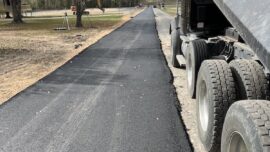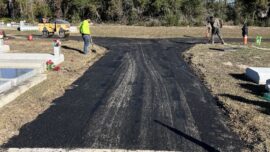Frequently Asked Questions
What Is the Difference Between Asphalt Paving and Sealcoating?
Asphalt paving and sealcoating are two distinct services. Paving is a construction process that uses a mix of aggregates, fillers and a binder called bitumen to create brand-new paved surfaces. Meanwhile, sealcoating is a vital maintenance service that helps protect asphalt paving. Sealcoating is a protective coating that shields asphalt pavement from weathering, UV-related oxidation, wear, leaking vehicle fluids and other damaging factors, mitigating damage and prolonging the surface’s lifespan.
Why Should I Choose Asphalt Pavement for My Paving Needs?
Asphalt is a sustainable paving material used throughout Houston and the world. There are several reasons to consider choosing asphalt over other alternatives.
- Cost-Effectiveness: Asphalt is more affordable than costly alternatives like concrete.
- Sustainability: Asphalt is one of the world’s most recycled materials. Old asphalt can gain another life in new paving projects, making it an environmentally friendly material.
- Longevity: Asphalt can last decades with proper care. It can also withstand heavy traffic, extreme weather and more with the right engineering and quality construction.
- Faster Installation: While all pavement installation takes time, asphalt doesn’t take as long to cure as other materials. Therefore, it’s quicker to install and is ready for use sooner.
- Comfort: High-quality paving offers a smooth and quiet driving experience.
- Easy Maintenance: Maintaining asphalt is a breeze, and many paving contractors offer professional maintenance and repair services for long-term reliability.
- Curb Appeal: Asphalt is a beautiful material with a rich black color that can complement any landscaping or architectural style.
How Long Will Asphalt Paving Last?
The average life expectancy of asphalt paving varies based on many factors, including the quality of the construction and ongoing maintenance efforts. The surface’s exposure to the elements and the traffic it gets also come into play. Most paved surfaces will last at least 15 to 20 years. However, it’s not uncommon to see asphalt paving last 30 years or more with vigilant care, regular inspections and timely maintenance service.
What Is the Best Time for Asphalt Sealcoating in Houston?
Successful sealcoating hinges on the right weather conditions and temperature. The best time to seal asphalt paving in Houston is late spring or early summer. During this time, the weather is consistently warm and dry, ensuring optimal conditions for application and curing.
Sealcoating companies can seal surfaces during the cooler months. However, contractors must be mindful of the weather forecast. The best conditions for sealcoating include low humidity levels, temperatures above 60 degrees Fahrenheit, moderate wind speeds and zero chance of precipitation.
What Is the Process for Asphalt Repairs?
Repairing asphalt is a multi-step process tailored to the unique damage you’re facing. Most repair projects begin with a thorough inspection, allowing contractors to understand the extent of the damage before determining the best approach. Next, teams will prepare the surface, removing debris and grime to ensure the work area is clean and dry.
From there, contractors can apply the most viable repair technique. That could be crack filling, sealing or patching. Whatever the case, experts perform the repairs before compacting the surface surface material and allowing the materials to cure.
How Often Is Parking Lot Striping Needed?
Parking lot striping improves safety, accessibility and traffic efficiency, but even high-quality paint will fade with time. When that occurs, you must invest in fresh striping to maintain visibility while avoiding compliance issues. How often to restripe parking lot pavement depends on several factors. The type of paint used, the level of traffic the parking lot experiences and its exposure to the elements come into play.
Generally, standard water- or solvent-based paints will start fading within a year of application on a standard surface lot. Therefore, it’s wise to restripe every 18 to 24 months. Higher-quality paint formulas like thermoplastic or MMA may retain visibility for several years. The best approach is to have striping contractors visit your property for regular inspections and guidance.
Is Asphalt Crack Filling Necessary?
Cracks and narrow voids don’t look like a major problem, but they can seriously damage your pavement. Even the smallest cracks allow water to penetrate the surface, infiltrating your pavement’s foundational layers. Over time, water can erode soil and negatively impact the pavement’s structural integrity, leading to potholes and other forms of severe damage.
Asphalt crack filling restores the pavement’s strength while preventing water infiltration. It greatly reduces the risk of further damage, prolonging your asphalt paving’s lifespan while improving its looks and reliability. Most contractors recommend investing in crack repairs at least once annually for damage mitigation.
How Do I Maintain My Asphalt To Keep It Looking Good for Years to Come?
Vigilant maintenance is key to long-lasting asphalt pavement. Here are a few tips for maintaining the appearance and integrity of asphalt paving over the long haul.
- Regular Cleaning: Keep your pavement clean. Trash, grime, overgrown vegetation and spilled fluids can cause premature oxidation and deterioration.
- Sealcoating: Protect your pavement from weather, wear and more with sealcoating. Regular sealcoating prevents pavement from becoming brittle and damage-prone.
- Crack Filling and Sealing: Repair cracks at least once annually to prevent water from wreaking havoc on your asphalt paving.
- Timely Repairs: When damage occurs, invest in timely repairs. The longer you wait to address issues, the worse things can get. Fix potholes, surface damage and any other problem that arises.
- Frequent Inspections: Inspections from a professional are the best way to ensure you’re providing all the care your pavement needs. They can track your pavement’s condition, look for early signs of trouble and recommend services that make a difference.



